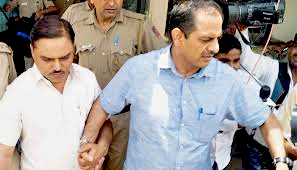New Delhi, Jun 14: More trouble is likely in store for ex-law minster of Delhi Jitendra Singh Tomar, who is already embroiled in an alleged fake degree case, as Delhi Police said on Saturday that his BSc degree too has been proven fake.

As per ANI, Delhi Police further said that verification of Jitender Singh Tomar's LLB degree is underway.
Delhi Police also said that Tomar had no knowledge about anything related to his educational qualification when questioned at the Faizabaad Awadh University and Ayodhya Saket College.
“No such degree has been issued by the University or college in his name,” ANI quoted Delhi Police as saying.
The investigating officers, however, found his name in the admission register of Vishwanath Singh Institute of legal Studies in Bihar's Munger.
Meanwhile, Saket Court today extended the police custody of Tomar by two days after. On expiry of his four-day police custody, Tomar was produced in the court.
According to news agency ANI, Delhi police had asked the trial court to extend Tomar's custody by 11 days saying every document that has surfaced during investigation is "fabricated", adding that it included a forged RTI which said that a Munger college, from where Tomar claims to have done his LLB, had said that Tomar had studied from their college.
The police also said that Tomar was required for further custodial interrogation to know about the persons who had allegedly connived with him in procurement of purported fake educational certificates.
"Every document produced by him (Tomar) is fabricated and it needs to be probed who are the people in connivance with Tomar in procuring these documents," police told the court, adding, "prima facie" charge under Prevention of Corruption Act was likely to come into effect in the case.
It alleged that records of Tilka Manjhi University, Bhagalpur, Bihar, were "torn which showed connivance of university officials with Tomar" and it might attract charges under the anti-graft law.
It said that lots of documents were required to be probed and the four-day remand granted earlier was not sufficient as almost 45 hours were spent in travelling more than 3,000 km.
Giving details of the probe carried out by it, the police said "Tomar's migration certificate issued from Bundelkhand University was also fabricated and we need to go there and probe this angle."
49-year-old Tomar, who was arrested in the case on June 9, was earlier in the day produced before Metropolitan Magistrate Pooja Aggarwa.
During the hearing, while Advocate Tarunveer Singh Khehar appeared as Special Public Prosecutor for Delhi Police, Delhi HC Bar Association Chairman Advocate Rajiv Khosala was appointed as the lawyer for the former Delhi law minister.
Opposing the police's plea, PTI quoted advocate Rajiv Khosla as saying that police had already been to all the places and seized all the documents.
Khosla also said that Tomar was not well and the only purpose for extension of remand was to "harass him as police were totally biased and acting on someone's will".
Tomar, who was present in the court room, told the court that he was being harassed by the police and all documents have already been recovered so there was no need for extension of the police remand.
He also said that his counsel was not allowed to be with him during the four-day custody. "All the registers and documents were seized and signed but I was not allowed to see them," Tomar alleged.
However, it was confirmed on Friday that Tomar had passed law examination in 1998-99 from a Bihar college.
Officials present during the questioning of Tomar, who was brought from Delhi by police at Biswanath Law College in Munger, said on condition of anonymity that college registers revealed that the former minister had enrolled in it under roll number 10136 in 1994-95 session.
The AAP minister was arrested last Tuesday following an investigation into a complaint by the Bar Council of Delhi that Tomar had obtained a fake law degree from the Institute of Legal Studies College in Munger.
Furthermore, AAP MLA Pankaj Pushkar lashed out at the top leadership of the party over its handling of Tomar's issue and asked Delhi Chief Minister Arvind Kejriwal to "apologise" to the people.
Pushkar, who had publicly sided with ousted AAP leaders Yogendra Yadav and Prashant Bhushan, said that the party should have acted against Tomar when the issue had first come to light.
"The facts came to light four months back. Why did not the party take action against him back then? If the leadership had paid heed to few voices, then this situation could have been avoided.
"The biggest damage has been inflicted on public trust. The party and Arvind Kejriwal should definitely apologise to the people of Delhi," Pushkar told PTI.
The Timarpur MLA said that the party should have a mechanism of "self-disclosure" instead of waiting for outside forces to compel it to disclose something.
"The other cases involving Vishesh Ravi (Karol Bagh MLA), Surinder Singh (Delhi Cantt MLA) should be acted upon. In case of doubt, one should go for immediate self-disclsoure," he said.
Pushkar said he would continue to raise his voice against apparent deviations from the principles of Swaraj, transparency and ethics by the party.
"I do not fear any action against me. But I cannot go against my principles," he said.
He also extended his full support to the Swaraj Abhiyaan movement launched by Yadav and Bhushan.






Comments
Add new comment